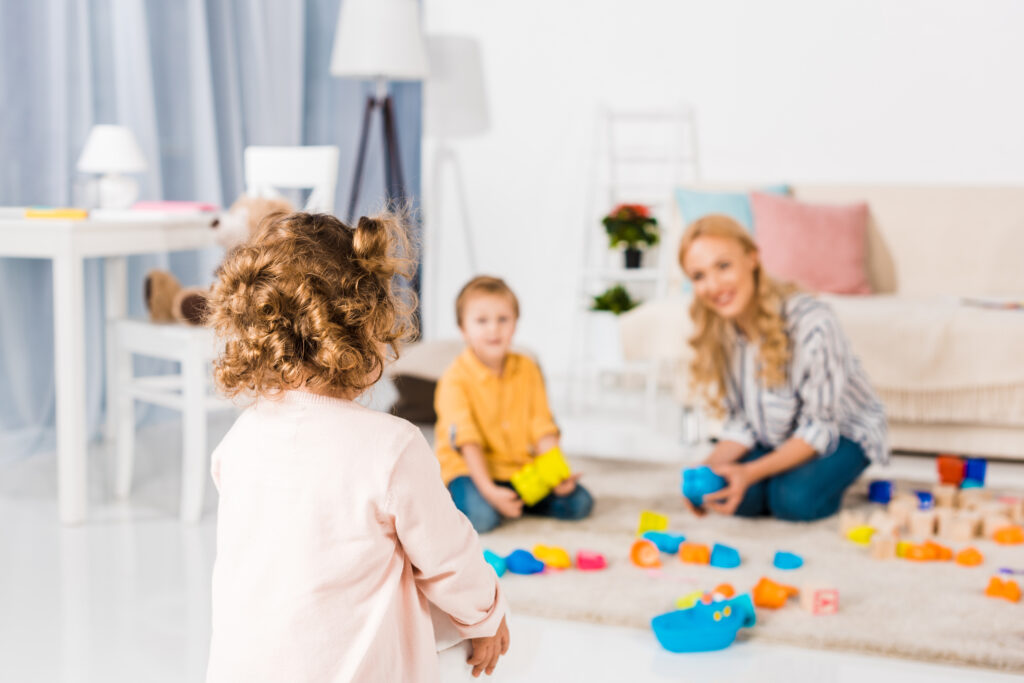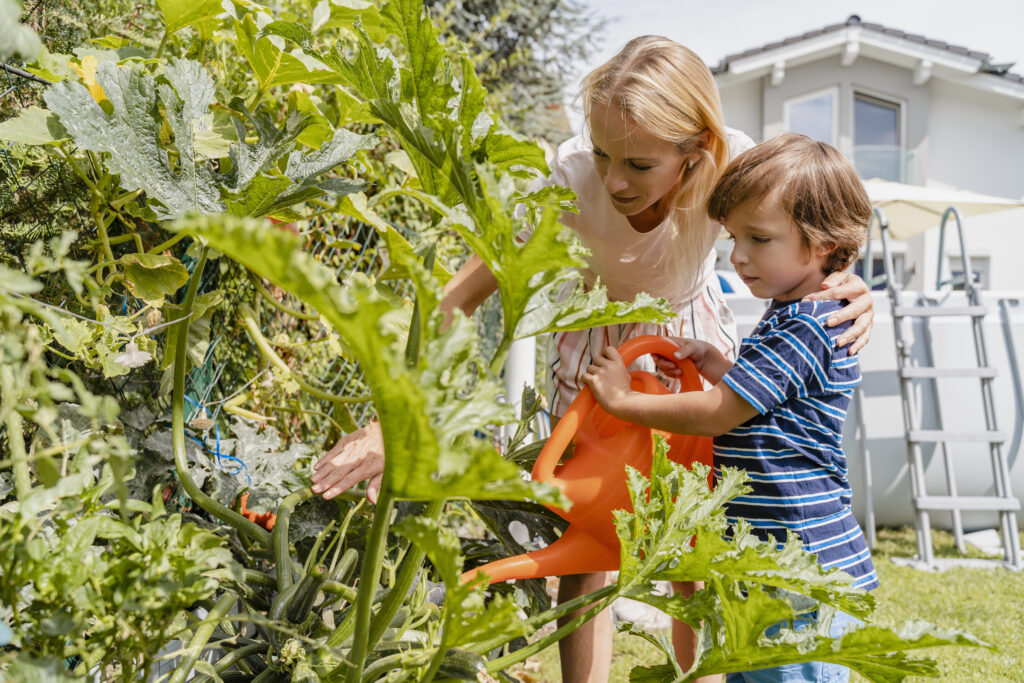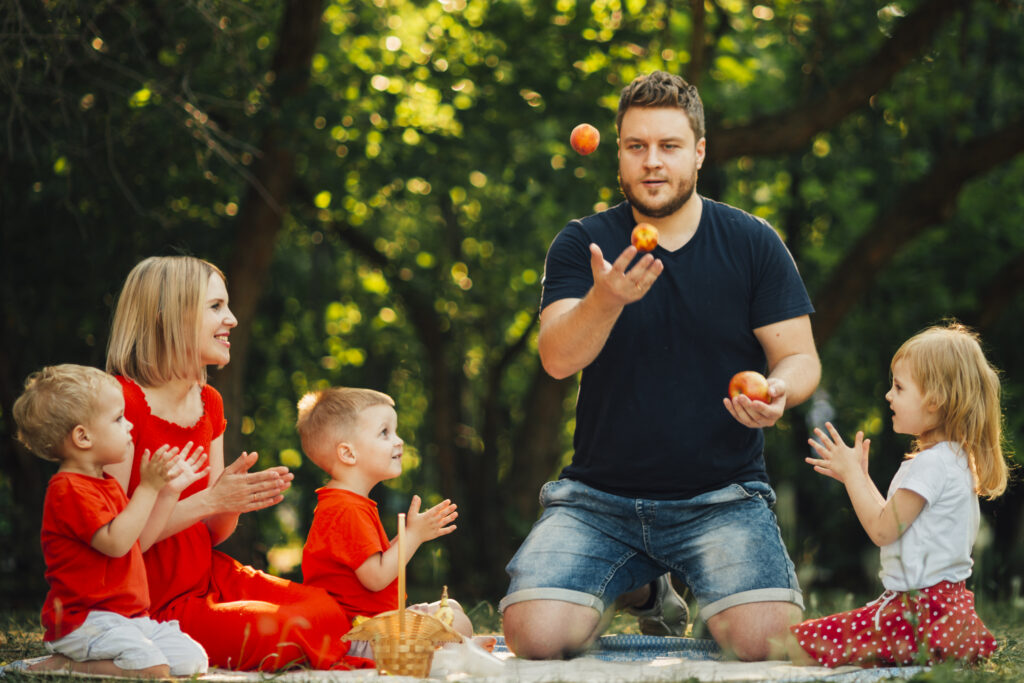The Connection Between Mindfulness and Peaceful Parenting

Introduction The present-day parenting of the modern world may be overwhelming, especially in the course of meeting the daily chores, emotional control, and meeting the needs of a child. Peaceful parenting does not mean finding some quick fixes to our issues- it is a journey of building a mental existence in our minds and in our families. Mindfulness as the conscious parent learns is the secret of responding and not reacting to difficult times and creating a place of safety, empathy and respect. Being a well-established child development professional who provides my services to families in the USA, I would support the benefits of mindful parenting as life-changing. As a part of this blog, I will discuss how the secret to harmonious relationships, healthy children, and family harmony is mindfulness. 1. Mindful Parenting Enhances Emotional Regulation Kids Need One of the most noticeable consequences of mindfulness is that it may help control the emotions of a person, not only in the parents but in children as well. Self-reflection and sleep are ways of daily life that can allow parents to address stressful toddler behavior in a non-stressed fashion. Children grow well in harmonious families where giant emotions are handled with patience, insight and instruction. Mindfulness also increases the ability of a parent to implement positive techniques of punishing toddlers- creating pleasant boundaries that instruct, rather than reprimand. Such thoughtful approaches yield sense of security, and confidence over time and this allows children to be emotionally street smart throughout their lives. 2. Family Meetings and Active Listening Parenting Promote Connection Mindfulness of parenting will start by being a full presence- listener; listening and affirming the voice of every group member. The connection of this nature is offered due to frequent family meetings. These meetings facilitate the free dialogue of emotions, difficulties and rules even on an informal level. Parenting at home through active listening enables parents to exhibit empathy and respect, a factor that reduces conflict and leads to increased trust. Listening actively assists the children to share and strengthen self-esteem and instills discipline as a team effort rather than a contention. 3. Holistic Child Development Is Fueled by Mindfulness Whole child development and mindfulness are similar. Peaceful parenting is not merely a behavior, as it builds all of the child developmental facets, such as emotional, cognitive, social, and moral. Parents should choose toddler activities that facilitate mindful engagement (outdoor play, meditation, or storytelling) to help children develop curiosity and compassion. Besides, parents can apply mindfulness to strengthen conscious co-parenting, increasing awareness of partnership, communication, and shared goals for the family’s well-being. It is a unified practice, which keeps the stress level under control, since there is harmony in life above individual interaction. Conclusion: Unlock Peaceful Parenting Through Mindfulness Mindfulness is not an objective but a habit that you practice on a daily basis and this transforms the parental experience. The awakening of awareness and emotional control and bonding will allow the parents the keys of peaceful parenting to every member of the family. One of the ways to start practicing these conscious steps is to research my expert resources, consultations, and courses aimed at helping every modern family on its mindful path. Don’t forget to follow me on Instagram, and YouTube. for motivation and practical parenting tips. Hack: Have a conscious morning every morning- inhale two times and make a purpose- take about a calm, interrelating day. You can find our recent news and updates in the latest press releases. My project, Vedangi Brahmbhatt, helps modern families discover peace through mindfulness. Explore my courses, books, and personalized service to your mindful parenting process visit vedangibrahmbhatt.com.
Break the Cycle: How Intentional Parenting Transforms Your Family’s Legacy

Parenting is a profound journey that not only shapes our children’s futures but also redefines the legacy we leave behind. Intentional parenting—making conscious, deliberate choices in raising our children—has the power to break generational cycles and foster a nurturing environment for future generations. Recognizing Generational Patterns Many families unknowingly perpetuate patterns from previous generations, which can influence behaviors, beliefs, and emotional responses. These patterns might include punitive discipline, authoritarian parenting, or fear-based interactions. Identifying these inherited behaviors is the first step toward transformation. The Power of Mindful Parenting Mindful parenting involves being present and attentive to our children’s needs, emotions, and experiences. This approach encourages parents to respond thoughtfully rather than react impulsively, fostering a deeper connection and understanding between parent and child. Practicing mindfulness can help break negative cycles by promoting patience, empathy, and emotional regulation. Strategies for Intentional Parenting 1. Self-Awareness and Reflection Understanding our own upbringing and its impact on our parenting style is crucial. Reflect on the behaviors and beliefs you’ve inherited and assess which ones serve your family’s well-being and which do not. This self-awareness allows for intentional choices in parenting practices. 2. Educate Yourself Investing time in learning about effective parenting strategies can be transformative. Resources like the best parenting books offer insights into nurturing and supportive parenting techniques. Educating yourself empowers you to make informed decisions that align with your family’s values. 3. Practice Nonviolent Communication Adopting nonviolent communication fosters respectful and empathetic interactions within the family. This approach emphasizes expressing feelings and needs without blame or judgment, promoting a harmonious family environment. 4. Implement Positive Discipline Strategies for Toddlers For parents of young children, adopting positive discipline strategies for toddlers can set the foundation for healthy behavior patterns. These strategies focus on guiding and teaching rather than punishing, encouraging toddlers to develop self-discipline and empathy. 5. Engage in Family Meetings Regular family meetings provide a platform for open communication, collective decision-making, and conflict resolution. They encourage active participation from all family members, fostering a sense of belonging and mutual respect. The Role of Child Development Specialists Consulting with a child development specialist can offer personalized guidance tailored to your child’s unique needs. These professionals provide insights into developmental stages and appropriate parenting strategies, supporting your journey toward intentional parenting. Benefits of Breaking Generational Cycles Embracing intentional parenting and breaking negative generational cycles can lead to: Conclusion Intentional parenting is a transformative approach that not only impacts your immediate family but also shapes the legacy you leave for future generations. By recognizing and breaking negative generational cycles, you create a nurturing environment where your children can thrive. Tip: Start by implementing small, consistent changes in your daily interactions with your children. Over time, these intentional efforts will lead to significant positive transformations in your family’s dynamics.For more insights and resources on intentional parenting, follow us on Instagram, and Youtube.
From Bedtime Story to Snoozing: 5 Tips to Help Your Kids Sleep Better

Getting kids to sleep can feel like a nightly battle. Whether it’s endless requests for water, another story, or struggling to settle down, bedtime can be challenging for both children and parents. The good news? With a few simple strategies, you can create a peaceful nighttime routine that helps your child sleep better and wake up refreshed. Here are five mindful parenting techniques to make bedtime easier and promote healthy sleep habits for your little one. 1. Create a Consistent Bedtime Routine A predictable bedtime routine signals to your child’s brain that it’s time to wind down. According to holistic child development experts, a routine that includes calming activities helps regulate sleep cycles and reduces nighttime resistance. Try this simple routine: The key is consistency—doing the same activities in the same order every night reinforces a sense of security and comfort. 2. Reduce Screen Time Before Bed Blue light from screens can interfere with melatonin production, making it harder for children to fall asleep. Instead of watching TV or playing on tablets before bed, opt for toddler activities like puzzles, coloring, or reading a book from the best parenting books list. Encouraging screen-free evenings is a great way to implement how to implement conscious parenting techniques at home, as it fosters presence and connection before bedtime. 3. Use Nonviolent Communication for Bedtime Struggles Kids often resist bedtime because they feel like they’re losing control over their environment. Instead of saying, “You have to go to bed now!”, try a nonviolent communication approach: When kids feel heard and respected, they are more likely to cooperate. 4. Set Up a Sleep-Friendly Environment Creating a calming sleep environment is key to better rest. Here’s how: By implementing positive discipline strategies for toddlers, you can frame bedtime as a special, enjoyable time rather than something they need to “obey.” 5. Encourage Self-Soothing Techniques Helping children develop their own calming strategies fosters independence and emotional security. If your child wakes up at night, encourage them to: For the conscious parent, teaching self-soothing techniques supports children in managing their emotions and becoming more confident sleepers. Final Thoughts: Making Bedtime a Peaceful Experience Bedtime doesn’t have to be a struggle. By creating routines, minimizing distractions, and fostering a conscious co-parenting approach, you can make sleep time a positive experience for the whole family. Tip: Keep a bedtime journal! Write down what works and what doesn’t so you can adjust the routine as needed. For more parenting insights and expert sleep strategies, follow us on Instagram and YouTube for tips on raising happy, well-rested kids. For the latest updates and parenting news, click here to view our recent press releases. Sweet dreams and happy parenting!
Finding the Right Babysitter: A Parent’s Guide

Leaving your child in someone else’s care is a big decision. Whether you need a babysitter for a date night, work commitments, or an emergency, finding the right person requires careful planning and trust. The key is to select someone who aligns with your parenting values and creates a safe, nurturing environment for your child. This guide will walk you through the process of finding a babysitter, conducting background checks, preparing interview questions, and ensuring proper training for your new sitter. How to Find the Best Babysitter The search for a great babysitter starts with knowing where to look. Here are a few reliable ways to find a trustworthy sitter: How to Background Check and Reference Check a Babysitter Trusting someone with your child requires due diligence. Here’s how to vet potential sitters: 1. Conduct a Background Check 2. Verify References 3. Hold a Family Meeting Before making a decision, hold a family meeting to introduce your child to the sitter. Observing their interaction will help you assess compatibility. Essential Questions to Ask in a Babysitter Interview The interview is a critical step in choosing the right babysitter. Here are some key questions to ask: Training Your Babysitter Once you’ve selected a babysitter, providing proper training ensures your child’s safety and comfort. 1. Household Rules & Routines 2. Emergency Contacts & Safety Plans 3. Emotional Support & Parenting Style 4. Active Listening & Communication Final Thoughts: Finding a Babysitter You Can Trust Choosing a babysitter is about more than just finding someone to watch your child—it’s about finding a trusted caregiver who aligns with your family’s values. By conducting thorough background checks, asking the right questions, and providing proper training, you can ensure a smooth experience for both your child and the sitter. Tip: Create a Babysitter Notebook! Include emergency contacts, daily routines, meal preferences, and activity ideas to help your sitter feel prepared. For more expert parenting advice, follow us on Instagram and YouTube for insights on hiring babysitters and raising confident children. For the latest parenting updates and recommendations, click here to view our recent press releases. Let’s make babysitting a stress-free and safe experience for your family!
The First Time at the Dentist: A Stress-Free Guide for Parents and Kids

A child’s first dental appointment is an important milestone, but it can also be an intimidating experience for both parents and children. The unfamiliar environment, new faces, and strange tools can be overwhelming. However, with the right preparation and a mindful parenting approach, you can make your child’s first dental visit to a Dentist for a smooth and positive experience. In this guide, we’ll explore how to find a great pediatric dentist, ways to prepare your child for their visit, and the pros and cons of fluoride treatments. How to Find a Good Pediatric Dentist Choosing the right dentist can make all the difference in ensuring a stress-free first visit. Here are some tips to help you find the best fit for your child: Preparing Your Child for Their First Dental Appointment Preparation is key in reducing fear and making the visit enjoyable. Here are some ways to help your child feel ready: 1. Talk About the Visit in a Positive Way Introduce the idea of going to the dentist in an exciting manner. Use books from the best parenting books list that explain dental visits in a fun and engaging way. 2. Role-Play at Home Set up a pretend dentist’s office at home where your child can take turns being the dentist and the patient. This makes the experience feel familiar before they even step into the real office. 3. Schedule a Family Meeting Hold a family meeting to discuss the importance of dental health and answer any questions your child might have. This gives them a sense of involvement and eases their concerns. 4. Use Nonviolent Communication Practice nonviolent communication by validating their feelings: “I understand you might feel nervous, but the dentist is there to help keep your teeth healthy and strong.” 5. Choose the Right Appointment Time Schedule the visit at a time when your child is well-rested and in a good mood, such as in the morning or after a nap. Pros and Cons of Fluoride Treatments Fluoride is commonly recommended to strengthen tooth enamel and prevent cavities, but some parents may have concerns. Let’s break down the benefits and drawbacks: Pros: Cons: If you’re unsure whether fluoride treatments are right for your child, discuss options with your dentist and explore natural methods for maintaining strong teeth. Final Thoughts: Setting the Stage for a Lifetime of Healthy Smiles A child’s first dental visit doesn’t have to be a stressful event. By choosing the right dentist, preparing in advance, and using positive discipline strategies for toddlers, you can help them feel comfortable and confident in the dental chair. Tip: Try brushing your teeth together as a fun activity! Kids love mimicking their parents, and this simple habit reinforces the importance of oral hygiene. For more parenting insights, don’t forget to follow us on Instagram and YouTube for expert guidance and practical tips. For the latest news and updates, click here to view our recent press releases and stay informed about the newest parenting trends and research. Let’s make dental visits a positive experience—one smile at a time!
Gardening with Kids: Growing Together, Learning for Life

Gardening with kids is more than just a fun outdoor activity—it’s a wonderful way to teach responsibility, patience, and the value of nurturing life. Whether you have a sprawling backyard or a small indoor space, gardening can create lasting memories while contributing to your family’s physical and emotional well-being. Let’s explore the benefits of gardening with kids, tips for getting started, and how to make gardening a year-round activity. The Benefits of Gardening with Kids Gardening provides a host of developmental and emotional benefits for children. It’s an engaging way to learn life skills while fostering parent-child bonding and encouraging hands-on learning. 1. Supports Cognitive and Emotional Development Gardening helps children develop problem-solving skills, patience, and resilience as they care for plants and observe the growth process. It’s a practical application of concepts like cause and effect, making it a great learning experience. 2. Encourages Physical Activity Digging, planting, and watering plants keep kids active and away from screens, contributing to their overall family well-being. Gardening can also be integrated into activities for toddlers, such as planting seeds or watering with a small can. 3. Promotes Healthy Eating Growing fruits, vegetables, and herbs encourages children to appreciate fresh, nutritious foods. Kids are often more willing to eat something they’ve grown themselves, fostering healthier eating habits. 4. Enhances Emotional Well-being Spending time in nature is known to reduce stress and improve mood. Gardening offers children a peaceful environment where they can connect with nature and feel a sense of accomplishment. Tips for Teaching Kids to Garden 1. Start Small Begin with easy-to-grow plants like radishes, lettuce, or herbs. These grow quickly and are less likely to frustrate young gardeners. 2. Provide Age-Appropriate Tools Give kids their own set of gardening tools that are safe and sized for their age. This makes them feel more involved and responsible. 3. Make It Fun Turn gardening into a game or challenge. For example, see who can plant seeds the fastest or grow the tallest sunflower. 4. Teach Through Play Incorporate mindful parenting by being present and engaging with your child’s curiosity. Answer their questions and share fun facts about plants, bugs, or soil. 5. Hold a Family Meeting Before starting a gardening project, hold a family meeting to plan what you’ll plant and where. This involves everyone in the decision-making process and boosts excitement. Gardening in the Yard Outdoor gardening offers a wealth of opportunities for exploration and learning. Indoor Gardening Year-Round If you don’t have outdoor space, indoor gardening is a fantastic alternative. Gardening Resources and Support For additional guidance, explore child development classes online or connect with a child development specialist to learn how gardening can support your child’s development. Access the best parenting resources to discover new gardening ideas and techniques. Stay informed by checking out our press releases here, and follow us on Instagram and YouTube for ongoing tips and creative ideas to empower your parenting journey. Final Thoughts: Growing Together Gardening with your kids is more than planting seeds—it’s about nurturing connections, fostering growth, and creating lasting memories. Whether you’re digging in the dirt together or tending to indoor plants, every moment spent gardening strengthens your bond and teaches your children the value of patience, responsibility, and care. So grab your tools, choose your seeds, and start growing something beautiful together. With every sprout, you’re not just growing plants—you’re cultivating joy, connection, and a love for the natural world that will last a lifetime.
Birth Order and Personality: Understanding Your Child’s Unique Traits

Birth order has long been a topic of fascination among parents and psychologists alike. It’s believed that a child’s position within the family—whether they’re the firstborn, middle child, or youngest—can influence their personality, behavior, and even the dynamics of their relationships. While every child is unique, understanding the general patterns associated with birth order can help parents foster stronger connections and create a harmonious family environment. Firstborn: The Responsible Leader Firstborn children often take on the role of the leader within the family. As the eldest, they tend to be more responsible, organized, and achievement-oriented. Parents often place higher expectations on firstborns, which can lead to traits like perfectionism and a strong drive for success. These children may also develop nurturing tendencies, stepping into a “mini-parent” role for their younger siblings. Key Traits of Firstborns: Parenting Tip: Encourage firstborns to relax and enjoy activities that allow them to unwind, such as activities for toddlers if they’re young or hobbies that don’t involve competition. Ensure they know it’s okay to make mistakes and prioritize fun alongside responsibility. Middle Child: The Diplomatic Peacemaker Middle children often find themselves in the role of mediator, balancing relationships between their older and younger siblings. They tend to be adaptable, social, and empathetic, as they’ve grown up navigating family dynamics. Middle children may seek their own identity outside of their siblings, often pursuing unique interests or friendships. Key Traits of Middle Children: Parenting Tip: During a family meeting, give middle children the opportunity to share their thoughts and feelings. This helps them feel valued and ensures their voice isn’t lost in the shuffle. Celebrate their unique interests to reinforce their individuality. Youngest Child: The Free-Spirited Charmer The youngest child often takes on the role of the family’s entertainer or free spirit. With older siblings to pave the way, the youngest tends to enjoy a more relaxed set of expectations. They’re often charming, creative, and adventurous but may also rely on others for support or decision-making. Key Traits of Youngest Children: Parenting Tip: While fostering the youngest child’s creativity, provide structure and encourage independence. Balancing freedom with responsibility ensures they grow into confident, capable individuals. How Birth Order Impacts Family Dynamics Understanding birth order can help parents create a harmonious family environment by recognizing and addressing the unique needs of each child. This aligns with mindful parenting, which encourages being present and attuned to your children’s emotional and developmental cues. Conscious co-parenting can also play a significant role in balancing dynamics. By collaborating on how to address each child’s individual needs, parents can reduce sibling rivalry and ensure that every child feels equally loved and supported. Tips for Navigating Birth Order Dynamics Stay Informed and Connected For more tips and insights on parenting strategies and child development, follow us on Instagram and YouTube. We share expert advice, practical tools, and real-life stories to empower your parenting journey. To stay updated on the latest research and resources, check out our press releases here for the most recent information on family dynamics and child behavior. Final Thoughts: Embracing the Unique Traits of Each Child Birth order provides a fascinating lens through which to view your children’s personalities, but it’s only one piece of the puzzle. By understanding their unique traits and tailoring your approach, you can nurture their growth, foster stronger relationships, and create a family environment where everyone thrives. Celebrate your firstborn’s leadership, your middle child’s diplomacy, and your youngest’s creativity. Together, these qualities make your family dynamic rich and special. Parenting is a journey, and with a little insight and intentionality, you can guide your children to become the best versions of themselves.
Raising Boys: Nurturing Connection and Understanding

Raising boys can be a wonderfully unique journey. Boys often engage with the world in ways that are more physical than emotional, and understanding this dynamic can help parents foster meaningful connections that support their development. While every child is unique, research shows that boys tend to explore and learn differently from girls. By recognizing these traits and adopting a mindful approach, parents can support their boys in a way that helps them thrive. How Boys Learn and Play Boys are typically more physically active, exploring the world through touch, movement, and play. They’re often drawn to activities that challenge their strength, coordination, and problem-solving abilities. This physical engagement is not just an outlet for their energy; it’s also essential for their brain development. Studies show that physical play can enhance boys’ cognitive skills, emotional regulation, and social interactions. For instance, activities for toddlers that involve building, climbing, or solving puzzles can provide boys with the physical stimulation they need while also encouraging cognitive growth. Simple games like building blocks or playing catch can improve motor skills and teach problem-solving in a hands-on way. Embracing these tendencies can make learning enjoyable and productive, especially for young boys. Emphasizing Physical Connection and Play While boys may express themselves through physicality, this doesn’t mean they’re any less capable of emotional depth. They simply may require different ways to express their emotions. Often, boys connect deeply during active play or shared physical activities. If you’re aiming for parent-child bonding, consider incorporating activities that allow boys to express themselves while engaging physically, like playing sports, hiking, or even roughhousing (within safe boundaries). Active play creates a space for boys to communicate nonverbally, making it easier for them to open up emotionally over time. For example, taking a walk together or working on a project side-by-side allows for shared moments that build trust. Parents can use these moments to gently ask questions or check in, creating opportunities for connection without forcing direct conversation. Supporting Connection of Emotional Growth in Boys While physicality is essential for many boys, fostering emotional growth is equally important. Boys may not always express emotions as openly as girls, so helping them identify and understand their feelings is crucial. Mindful parenting can be a valuable approach here, as it encourages parents to observe their child’s emotional cues and respond with patience and empathy. Encourage boys to recognize and name their emotions. During a family meeting, for example, create a safe space for everyone to share their feelings, even if it’s just a few words. Boys often benefit from seeing emotions discussed openly and positively, which teaches them that it’s okay to feel and express their emotions. Using conscious parenting strategies like active listening and affirming their feelings can help boys understand that emotions are natural and important. This is especially impactful when practiced consistently, as it models a balanced approach to both physical and emotional engagement. Practical Tips for Raising Boys Nurturing Growth Through Connection Raising boys is about more than just managing their energy levels. It’s about recognizing their unique ways of connecting, learning, and growing. By fostering both physical engagement and emotional openness, parents can create an environment where boys feel secure, understood, and valued. If you’re interested in learning more about parenting strategies that support healthy, well-rounded development, follow us on Instagram and YouTube. We share tips, insights, and resources to help you navigate your parenting journey, building deeper bonds and a supportive family dynamic. Remember, every child is unique, and the journey of raising boys is filled with moments of discovery and growth. Celebrate these milestones, and know that each day brings new ways to connect, understand, and nurture the young men they’re becoming.
Raising Girls: Nurturing Emotional Connection and Growth

Raising girls comes with its own unique joys and challenges. Often, girls are wired for emotional connection before physical connection, making relationships, communication, and empathy key elements in their development. Understanding this can help parents create an environment that nurtures these strengths, while also fostering independence and resilience. By meeting their daughters’ emotional needs, parents can build a foundation of trust, love, and respect that lasts a lifetime. The Power of Emotional Connection From a young age, girls tend to be drawn toward emotional and social engagement. They’re often curious about relationships, keen observers of emotions, and naturally inclined toward empathy. This tendency doesn’t mean they won’t enjoy physical activities, but it does highlight the importance of parent-child bonding in their development. When parents prioritize connection, girls feel understood, valued, and secure, which supports their confidence and self-esteem. This emotional connection begins in simple ways, such as spending quality time together, engaging in deep conversations, and actively listening to their feelings. Mindful parenting can be particularly effective here, as it encourages parents to tune in to their child’s emotional world and respond thoughtfully, rather than reactively. Girls often benefit when parents model open communication and emotional awareness, teaching them that their feelings are valid and worth exploring. How Girls Learn and Engage Girls are typically more interested in activities that involve communication, storytelling, and creative play. For instance, activities for toddlers like role-playing, drawing, and reading aloud can be incredibly engaging for young girls, as they combine creativity with social interaction. Storytelling, in particular, helps girls develop language skills, empathy, and a better understanding of emotions. As girls grow, they often seek opportunities to connect and engage with others, whether through friendships, teamwork, or collaborative learning. Parents can support these tendencies by creating opportunities for social interaction and encouraging activities that emphasize teamwork and cooperation. This doesn’t mean girls won’t thrive in independent activities, but social and emotional engagement is often a key motivator in their learning process. Building Emotional Intelligence To support your daughter’s emotional growth, it’s essential to nurture her emotional intelligence. This means helping her recognize and manage her emotions, as well as understand the emotions of others. Activities that encourage self-reflection, such as journaling or drawing, can be great tools for girls to explore their feelings. Holding regular family meetings can also be a way to encourage emotional openness. These gatherings create a safe space for everyone to share their thoughts, address conflicts, and practice respectful listening. When girls see their parents valuing emotional expression, they learn that it’s okay to express vulnerability and ask for support. Practical Tips for Raising Girls Encouraging a Growth Mindset Girls may sometimes feel pressured to be perfect, which can lead to anxiety or self-doubt. To counter this, encourage a growth mindset by celebrating effort and resilience rather than perfection. Remind her that mistakes are part of learning and that growth comes from trying new things, even if she doesn’t succeed right away. This helps her develop a healthy self-image and the courage to take risks. Final Thoughts: A Journey of Connection and Empowerment Raising girls is a rewarding experience, filled with moments of deep connection and joy. By prioritizing emotional connection, supporting her independence, and nurturing her growth mindset, you’re helping her build a strong foundation for the future. Girls who feel valued, understood, and respected grow into women who are confident, empathetic, and resilient. If you’d like more tips on raising confident and emotionally intelligent daughters, follow us on Instagram and YouTube. We share insights, resources, and practical advice to support your parenting journey and foster healthy family dynamics. Remember, every moment spent connecting with your daughter is an investment in her future. By showing her love, understanding, and support, you’re not only raising a daughter—you’re nurturing a strong, compassionate individual who will carry these lessons forward for a lifetime.
Protecting Your Marriage in the Midst of Parenthood

Parenthood is a beautiful journey, but it can sometimes overshadow the relationship that started it all—your marriage. It’s easy to become consumed by your child’s needs and, without realizing it, place your marriage on the back burner. While a child-centered home might sound ideal, when the marriage suffers, so does the child. A strong spousal relationship is the foundation for a healthy family, and protecting it during the busy season of parenting is essential for both your marriage and your child’s well-being. Why Protecting Your Marriage Matters Children thrive in environments where they witness love, respect, and cooperation between their parents. Mindful parenting teaches us to focus on emotional awareness and nurturing our children’s needs. But how can we effectively parent if we aren’t nurturing the most important relationship in the family? Studies show that marital satisfaction significantly affects not only the parents’ well-being but also the emotional stability of the child. Therefore, a healthy marriage is just as essential as family well-being. Tips for Protecting Your Marriage While Parenting Prioritize Communication: Amid the chaos of parenting, finding time to talk can feel impossible. But it’s essential. Scheduling regular check-ins with your spouse can help both of you stay on the same page. Whether it’s discussing parenting approaches, dividing household duties, or just sharing your thoughts and feelings, open communication is crucial for protecting your relationship. These regular chats also serve as a family meeting between you two, reinforcing the foundation of your partnership. Schedule Date Nights: Just because you’re parents doesn’t mean date nights are a thing of the past. Protecting your marriage requires intentional time together. Find a babysitter or swap kid-free time with another family and get out of the house! Whether it’s a quiet dinner, catching a movie, or simply taking a walk, spending one-on-one time strengthens your bond and allows you to reconnect as a couple. Set Boundaries Between ‘Parent’ and ‘Partner’: It’s easy to lose your identity as a partner when you’re deep in the trenches of parenting. While your role as a parent is important, it’s vital to set boundaries and allow time for your role as a partner. You’re still two individuals in a relationship outside of your parenting responsibilities. Acknowledge this with small gestures—like leaving each other notes, sharing a cup of coffee before the kids wake up, or simply asking how their day was. These small moments add up and remind both of you that your relationship matters. Share the Load: Parenting is a team effort. Dividing and conquering tasks—whether it’s school runs, meal preparation, or bedtime routines—helps alleviate stress and prevents one partner from feeling overwhelmed. A conscious co-parenting approach ensures that both parents are actively involved, making the relationship feel more balanced. This teamwork reinforces the fact that you’re not only partners in parenting but also in life. Remember the Long Game: Kids grow up fast, but marriages are intended to last a lifetime. During the most challenging days, remind yourselves that you’re in this together for the long haul. The challenges you face today will pass, but the bond you build by working through them will strengthen your marriage in the future. Learn and Grow Together Parenting is an evolving journey, and it can help if both you and your spouse continue learning together. Whether it’s reading parenting books, attending workshops, or taking child development classes online, growing together as both partners and parents strengthens your marriage. This is also a great opportunity to model lifelong learning and collaboration for your children. Explore Our Resources If you’re looking for more support in balancing parenting and marriage, we’ve got you covered. Our website offers a variety of resources, including parenting tips, articles on conscious parenting, and tools to help you maintain a strong partnership while raising children. Additionally, don’t forget to follow us on Instagram and YouTube for ongoing tips, tools, and insights that will empower your parenting journey while keeping your marriage strong. These platforms offer real-life examples, practical advice, and expert interviews that can help you maintain balance. Final Thoughts Your marriage is the bedrock of your family. By protecting your relationship during the busy parenting years, you’re not only ensuring a strong connection with your spouse but also modeling a healthy partnership for your children. Prioritize communication, make time for each other, and remember that while parenting is important, your marriage deserves care and attention too. Start small—schedule a date night, send a loving text, or check in with your spouse today. You’ll be surprised at how these simple acts can transform your relationship and strengthen your family dynamic.Ready to take the next step in protecting your marriage? Visit our website for more tips and resources, and don’t forget to follow us on Instagram and YouTube for practical advice that will help you nurture your marriage while raising a thriving family.

